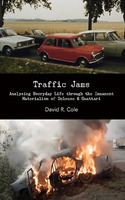Traffic Jams
Analysing Everyday Life through the Immanent Materialism of Deleuze & Guattari
Author(s)
Cole, David R.
Collection
ScholarLedLanguage
EnglishAbstract
This dead letter presents an exploration of the immanent materialism of Deleuze & Guattari as theorised in A Thousand Plateaus as a means to analysing everyday life. The evidence consists of art, film and objects from life that relate to and suggest the complex ways in which we are affected by traffic jams. Reciprocating substrata of everyday life build upon the unconscious, and show how the abstract turbulence of everyday life forms eddies and flows that may be followed and understood. The immanent materialism of Deleuze & Guattari is a philosophical construction that leads to the formation of ‘plateaus’ as they were executed in A Thousand Plateaus. The plateau of this dead letter is [21 October 2011: the Petro-Citizen] and is populated with traffic jams, car crashes, global environmental concerns and the psychological and sociological contingencies that accompany the petro-citizen. Connections between the strata that make up the plateau of the petro-citizen will deliberately be left as open-ended and speculative to show how the petro-citizen functions as a flagrant construct in everyday life, which includes the desire for petrol and explains the resulting panpsychic petro-political landscape. The double-articulation of the plateau depends upon the ways in which the petro-citizen and petro-politics create reciprocating realms of motivation and drive that tend towards contemporary double-articulation, paradox and contradiction with respect to the usages of oil. This double-articulation results in a multiple chequered flag or illusionary global end-game that designates the current human relationships with oil.
Keywords
Gilles Deleuze; Felix Guattari; traffic; petropolitics; cultural studies; oilDOI
10.21983/P3.0023.1.00ISBN
9780615767000OCN
924649154Publisher
punctum booksPublisher website
https://punctumbooks.com/Publication date and place
Brooklyn, NY, 2013Classification
Material culture


 Download
Download